Uh oh.
Um. I don’t know how to tell you this, but I kinda screwed up. I was supposed to write a double feature post for today, but instead I killed everyone within a ten-mile radius. It was an honest mistake. Just, you know, some communication breakdowns compounded by personal foibles. These things happen.
And now they’re dead. All dead.
That’s probably why we’re getting such lousy blog traffic today? I sure won’t make that mistake again. I mean; I can’t. You can only kill someone once, unless you’re playing Tekken or something.
But I suppose there is a silver lining. All this completely avoidable murder reminds me of two movies, both first films from interesting directors, both a little rough, but still gristly and funny and shocking. These films tell the happy tales of folks who don’t mean to make everyone around them deader, but well, once that ball gets rolling…
If you’re still alive, maybe you will enjoy watching these movies back to back? If you’re not still alive, I guess don’t bother.
Blood Simple (1984)
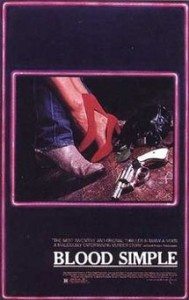 Joel Coen has made a few fairly decent films in partnership with his brother Ethan. Maybe you’ve heard of some of them? No Country for Old Men was kind of a big deal, if you like your killers armed with a captive bolt pistol and a pageboy haircut. Other people go nutso for The Big Lebowski and Fargo. Personally, I’m more into their earlier stuff: Raising Arizona, Barton Fink, Miller’s Crossing, and Blood Simple. For a long time I would have said they were my favorite director(s).
Joel Coen has made a few fairly decent films in partnership with his brother Ethan. Maybe you’ve heard of some of them? No Country for Old Men was kind of a big deal, if you like your killers armed with a captive bolt pistol and a pageboy haircut. Other people go nutso for The Big Lebowski and Fargo. Personally, I’m more into their earlier stuff: Raising Arizona, Barton Fink, Miller’s Crossing, and Blood Simple. For a long time I would have said they were my favorite director(s).
Blood Simple is a sticky little Texas-set neo-noir. In it, what’s scary is all a misunderstanding. It’s rough and raw for the Coens—their freshman effort—but it’s also as good, if not better, than much of what came later. In it, the elements of their style coalesce.
Dan Hedaya plays Marty, a bar owner and sleaze bag. He thinks his wife Abby (Frances McDormand; actually married to Joel Coen) is cheating on him with his African-American bartender Meurice (Samm-Art Williams). He hires a disreputable private detective, Visser (M. Emmet Walsh), to find out for sure.
Those are his first two mistakes.
In another mistake, Abby chooses that particular moment in time to leave Marty. Following the trend of making bad moves, Marty’s other bartender, Ray (John Getz), offers Abby a ride out of town. They confess their mutual attraction to each other and end up in a motel. So if Abby was indeed cheating on Marty up till now, it wasn’t with Ray. Ray just suffers a lapse in judgement at a bad moment. Communication breakdowns, personal foibles, bad timing: all of that results in photos of Abby and Ray in delicto flagrante flopping onto Marty’s desk like dead fish.
Marty isn’t pleased.
Now, if this were a normal noir, or even a normal Hollywood thriller, characters would start doing crazy stupid things and you’d be forced to scream at them, “Hey! Stupid face! Just — seriously — just ask someone what’s happening and then all your problems will disappear.” This isn’t a normal noir, though. This is a film written by Joel and Ethan Coen. And when those boys are on, watch out.
In Coen Brothers films, particularly their non-wacky ones, each word of dialogue gets weighed on the scale. Miller’s Crossing is this way, where going to the bathroom or sneezing can mean you misunderstand entire subplots. Blood Simple isn’t nearly as quick with meaning as that film, but it does keep up the sprint. It’s so clearly plotted and well structured that the director’s cut that got released in 1995? It’s SHORTER.
Yep. When they took a look at their first effort a decade later, the Coens didn’t decide to add in all the stuff they’d been forced to cut, they made the film leaner. They cut out three minutes and—no surprise—it works better.
But deadly errors. Throughout the ever-escalating course of Blood Simple, everybody makes terrible, horrible, fatal mistakes. None of them are stupid mistakes though. No one does anything you can’t imagine yourself doing—assuming you’ve buried someone alive. Events just spiral out of control. That’s what events do. And that’s why you should avoid killing people if at all possible.
Let this be a lesson to you.
When you’re watching Blood Simple, you’ll notice some things that hallmark the Coens work to come. They’ve got an inquisitive camera that slowly pokes its nose where it oughtn’t go. They’ve got a way of building scenes that double-cross suspense with comedy. Another familiar element is a score by Carter Burwell—this one like a janky elevator ride down into your grave. Echoing heartbeats slow in irregular pulses and… yeah. Someone else is dead. It’s inevitable.
The thing about Blood Simple is, is that the mystery of it isn’t what you expect. As an observer, you’ll know exactly what’s happened and who’s done what. The mystery is instead whether or not you’d fare any better than these poor saps in the same circumstances.
Blood Simple builds to a climax that makes it clear why this film launched the Coens’ highly lauded careers. It will etch your faces in one of those Joker-style smiles. And if it doesn’t make you adore M. Emmet Walsh, someone ought to give you what for.
In case you’re wondering, the title for Blood Simple comes from Dashiell Hammett’s hardboiled masterpiece Red Harvest. It’s an expression used in that book to describe what happens to someone when violence shorts out their brain. They go blood simple.
Down Terrace (2009)
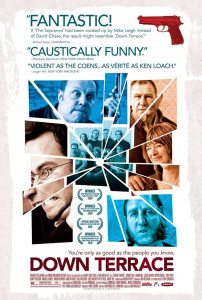 Ben Wheatley’s first feature, Down Terrace, is only a few years old. Since then, he’s directed Kill List, Sightseers, a segment in The ABCs of Death, and A Field in England. Is he my new favorite director? No. But he knows how to kill people and that’s a good start.
Ben Wheatley’s first feature, Down Terrace, is only a few years old. Since then, he’s directed Kill List, Sightseers, a segment in The ABCs of Death, and A Field in England. Is he my new favorite director? No. But he knows how to kill people and that’s a good start.
Down Terrace is a comedy, if you find avoidable homicide amusing. Bill (Robert Hill) and his son Karl (Robin Hill, yes, Robert’s son) get out of prison after being stitched up by one of their close associates. Whom exactly, they can only guess, with the help of the materfamilias, Maggie (Julia Deakin, whom you may recognize from Spaced). Bill, Karl, and Maggie are drug dealers and club owners and involved in other sorts of vaguely defined organized crime.
Exactly what they do isn’t so important. It’s how their dysfunctional relationships and personalities lead to murder that’s important. And by important I mean ‘horribly amusing.’
Wheatley films his subjects in a casual, intimate fashion. He disregards story in favor of character, which is evidenced in ample dialogue. Man these people can witter on entertainingly. They’re also good at sulking, exploding into rage, and killing people. While the general thread of the story is “we need to find out who ratted us out,” that gently transmogrifies over the running time into the sort of family drama that would make Ma Barker proud.
When they get back from lock up, Bill and Karl get swamped with underlings hoping to improve their positions. Karl’s girlfriend (of questionable commitment) comes calling too, ever-so briefly preceded by her pregnant belly. Overwhelmed by pretty much everything and as stable as rutherfordium-261, this second-rate mafia family decides action is better than words. Everyone gets into the act, targeting the person they trust the least regardless of their culpability.
Of course, it’s all a horrible, deadly, fatal mistake. Once you start killing, events just spiral out of control. That’s what events do. And that’s why you should avoid killing people if at all possible.
Let this be a lesson to you.
Or did I say that already?
In any case, killing: bad, and kind of funny.
Think of Down Terrace as spending Thanksgiving with the criminally insane. Or maybe that’s how you’d describe your family anyway? Thing is, that in this film, like in Blood Simple, people are just people. There aren’t any crazy axe-murderers or diabolical geniuses; just messed up folks in situations they don’t know how to handle.
Down Terrace (named for the neighborhood in Brighton in which it’s set) is more exaggerated than Blood Simple, with its characters tending farther into extremes, but it shows the promise that Ben Wheatley is continuing to prove.
If you like this one, you’ll like Sightseers even better.
Unless you’re dead.

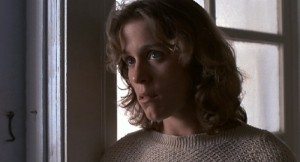
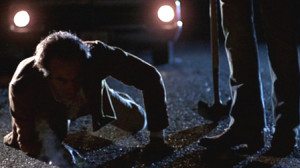
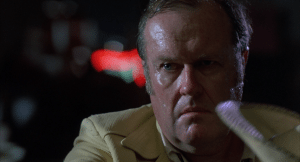



Random double-feature suggestion, a Freddie Francis combo: “The Innocents” and “Girly.”
I’ve seen neither. I’ll look into both.
I would say they’re both must-see, but for different reasons. But I’ve only seen each one once and it’s been a while, so maybe I should get corroborating evidence, say, from a second viewing, before I commit to such a glowing recommendation. I thought of Girly because of your recent comment about needing more “obscure, rare and curious titles” to add to your list. Girly fits the bill. It’s somehow charming and creepy at the same time. The Innocents isn’t really obscure, rare or curious, but it is a classic, and the black-and-white cinematography is jaw-dropping. And it’s also a bit spooky, which is why I chose it (and not The Elephant Man) for the Freddie Francis double feature. A spooky b&w classic and a charmingly creepy oddity: seems like a nice evening.
I’ve not seen those either, though The Innocents is on my netflix queue. So few movies, so much time. Wait. Reverse that.
I wish I had a random, witty Gene Wilder line to put here.